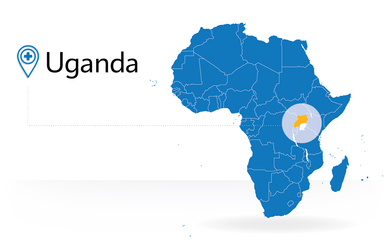Lecture de 6 m
8 avril 2025
LA SANTÉ COMMUNAUTAIRE ET MONDIALE
Article
How three countries are fighting back against tuberculosis
Bringing fast and accurate diagnostic tools to remote communities is helping to save lives. Health professionals from three high-burden countries explain how they’re getting to grips with tuberculosis.
Tuberculosis (TB) has plagued humans for thousands of years. Even today, it remains the world’s deadliest infectious disease. In 2023 alone, 10,8 million people are thought to have contracted TB, with 1:25 million people dying.
More than 80% of the world’s TB cases and deaths are in low- and middle-income countries, with the burden rife where there is poverty, malnutrition, and obstacles to accessing health care. But with perseverance and ingenuity, TB can start to be overcome, as activities in three high-burden countries are showing.

Ouganda
Timing is critical in TB control. The longer diagnosis is delayed, the longer people need to wait for potentially life-saving care, and the more the disease spreads.
For Dr. Faustine Erau, a clinical officer at St. Kizito Matany Hospital in rural Uganda, delays were a major challenge. 6 years ago, when he joined the hospital, microscopy was still being used to diagnose TB: “test results could take a week,” he says. Now, the hospital uses GeneXpert® systems, which give turn-around times of mere hours.
In the first half of 2023, Erau’s team diagnosed over 7 000 TB cases, with a 93% treatment success rate. But technology alone is not enough. Uganda has also mobilized so-called ‘expert clients’—former TB patients who help screen communities, collect samples, and educate people about the disease. By expanding the frontline, these expert clients are turning survivors into allies in the fight.

Pakistan
You can’t always expect patients to come to health services, especially if it’s an arduous journey and they can’t afford to take time off work. Sometimes services have to come to patients.
That is the idea behind ‘chest camps’—mobile clinics equipped with X-ray machines, GeneXpert testing, and small medical teams. Run by Mercy Corps, these vans bring TB diagnostics and care to Pakistan’s most marginalized communities.
“Engaging communities is the most crucial step,” says Dr. Adeel Tahir, a senior program manager at Mercy Corps, referring to the value of going into the community and conducting focus groups to help refine the program and ensure acceptance.

Vietnam
Vietnam has been an enthusiastic adopter of innovative tools such as rapid molecular testing and portable X-ray machines. As a result, the country has seen sharp reductions in TB prevalence and mortality—prevalence is down 35% since 2007, and mortality dropped 41% between 2015 and 2020.
Nonetheless, there is still some way to go. “Most TB work relies on external funding, which remains inadequate,” says Dr. Dinh Van Luong, head of Vietnam’s National TB Program. The country has 332 GeneXpert systems across 179 sites, but with 700 districts, many areas still lack access. Limited human resources and staff training add further constraints.
The Trillion-Dollar Question
Efforts like these are making a dent in TB’s global burden. But without sustained action, 28 million people could die from TB by 2030, at a global cost of US$1 trillion.
War, worsening social conditions, and funding instability could fuel a resurgence in TB. Political will must stay laser-focused if this ancient enemy is to be defeated.
Note
This article is based on original Cepheid-supported reporting done by Devex. The original report is available here https://devex.shorthandstories.com/how-decentralized-testing-is-advancing-tb-diagnosis-and-treatment/index.html
Lire la suite
PLUS D’INFORMATIONS








